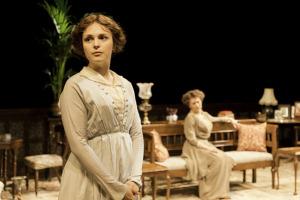Versailles
Here's a surprising and stimulating thing: a history play that looks forwards as well as backwards. Peter Gill's new play Versailles deceptively adopts the form of an old-fashioned drawing room family drama -- even to the point that it is played out in three separate, leisurely acts -- but it has powerful, pertinent (and sometimes impertinent) things to say in this centenary year of the outbreak of the First World War about how the negotiations of the peace at Versailles in 1919 have had a lasting legacy on the world.
That settlement, designed to preserve peace but which served to both humiliate and economically undermine Germany, inexorably led not only to the Second World War but also to consequences we are still living with today.
The play takes a long view, in every sense -- it runs for three hours, including two intervals -- that's full of dense exchanges between talking heads. But Gill adeptly keeps the debate flowing to ask important intellectual, philosophical and economic questions to personalise as well as dramatise them.
It is cleverly done via a portrait of a family who are trying to resume life after the war. But it's not so easy to let go of such a calamitous past, not least because the family's son Leonard is one of the British civil servants helping to draft the treaty, so it leads to a lively act one drawing room discussion about what Versailles will hope to achieve. And it is complicated, of course, by real human loss, including Leonard's own of his fallen lover Gerald, one of those slowly detonating facts that ripples through the play and is constantly revisited as his ghost makes regular appearances.
TV's Downton Abbey may have provided a more kaleidoscopic view of a family living through and beyond the same war, with its localised view of the impact on them and the community around them. But I also couldn't help thinking of it as I watched this play, not least because of Richard Hudson's elegant Downton-esque set and costumes. But Gill takes a much broader, international view.
A superb cast that includes Gwilym Lee as Leonard, Tom Hughes as his late lover and Francesca Annis as Leonard's mother give it a tender humanity. Gill directs his own play with feeling and precision.
"For a dramatist of Gill's experience the writing is, at times, surprisingly inept ... The play looks a treat however in Richard Hudson's elegant design, and the acting is often excellent."
Charles Spencer for The Telegraph
"... the play wittily and movingly evokes a society struggling to adjust to the problems of peace."
Paul Taylor for The Independent
"Gill's play runs for three hours, and I loved every minute of it."
Michael Billington for The Guardian
"... it is packed with meticulous research that sometimes makes it resemble the more ponderous sort of history lesson."
Henry Hitchings for The Evening Standard
External links to full reviews from popular press
- Telegraph - Independent - Guardian
Originally published on
